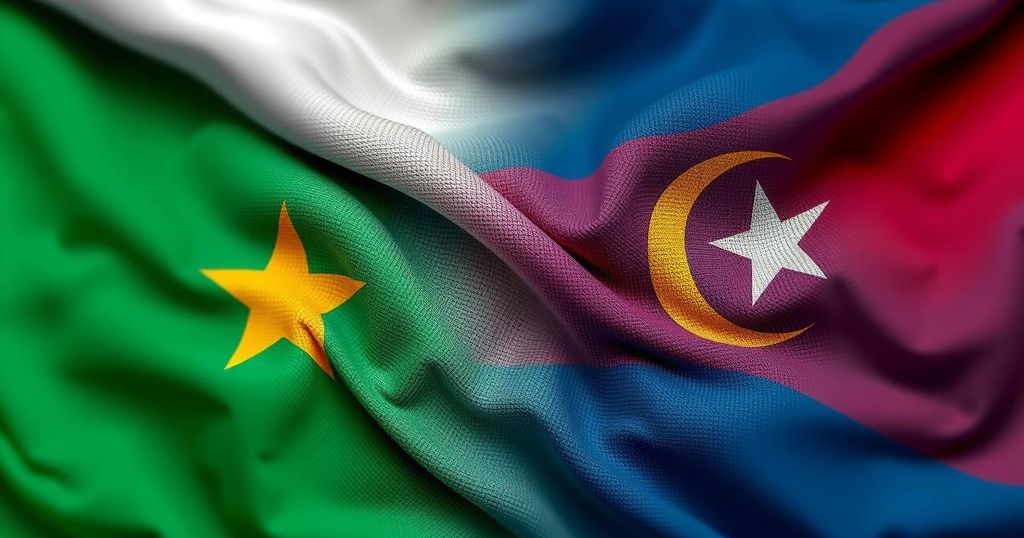The recent visit of Sudan’s Lt Gen Abdelfattah El Burhan to Eritrea underscores efforts to strengthen military and economic alliances as tensions rise in eastern Sudan. Both countries seek to solidify cooperation amidst fears of escalating tribal conflict, driven by armed factions aligned with the SAF and Eritrean training camps. The delicate balance of stability in the region is increasingly at risk as these dynamics unfold.
On Tuesday, Lt Gen Abdelfattah El Burhan, the leader of Sudan’s Sovereignty Council and Commander-in-Chief of the Sudanese Armed Forces (SAF), concluded a significant visit to Asmara, Eritrea’s capital, accompanied by members of his new cabinet. This meeting with President Isaias Afwerki centered on enhancing military cooperation, security coordination, and strengthening economic ties, resulting in agreements that underline Eritrea’s role as a supportive ally amidst Sudan’s ongoing crisis. President Afwerki emphasized the need for Sudan’s internal resolution of its challenges, advocating for the country’s sovereignty and regional stability.
Analysts view the visit as a strategic move to solidify Eritrea’s position as a supporter of Sudan’s military, noting the sensitivities surrounding armed groups operating out of Eritrea. Eritrea currently provides refuge to various eastern Sudanese armed factions, such as the Beja Congress and the United Popular Front for Liberation and Justice, both of which coordinate with the SAF and contribute troops within Sudan’s eastern territories. Eritrea’s agenda includes establishing a ‘security belt’ along its borders to avert any spillover of conflict.
Additionally, the dialogue encompassed economic initiatives, particularly discussions on reopening critical trade routes, including the Kassala-El Lafa highway, with reports indicating that 80% of the necessary revitalization work has been completed. President Afwerki’s dedication to ensuring regional stability suggests that he may be prepared to intervene should Sudan’s internal strife extend to eastern territories.
In eastern Sudan, tensions have recently escalated, with various armed factions, including the Eastern Battalion and the Beja Congress, regrouping alongside the SAF. Some of these militia movements are reportedly linked to Eritrean training camps, raising alarms about potential clashes and a slide into tribal conflict. Specifically, Amin Daoud’s Eastern Battalion, which had remained neutral, now appears to support the SAF, enhancing fears that the conflict with the paramilitary Rapid Support Forces (RSF) could escalate into a larger tribal conflict.
The establishment of Eritrean training camps for groups such as the Eastern Sudan Liberation Forces and factions from Darfur intensifies the region’s militarization. Political analysts caution that this situation, coupled with the strategic significance of eastern Sudan, rich in resources and proximity to vital Red Sea ports, could deepen tribal divisions and threaten regional stability. Consequently, the evolving military alliance between Sudan and Eritrea poses a serious risk of exacerbating tensions and fragmentation within eastern Sudan.
The ongoing crises in Sudan have generated significant military and political ramifications in the region, particularly concerning its relations with Eritrea. Sudan’s government has sought strategic alliances to bolster its security and stability amidst internal conflict. Eritrea’s historical role as a military ally to Sudan’s armed forces plays a pivotal part in shaping the regional geopolitical landscape, as discussions surrounding military cooperation and economic ties gain prominence. The involvement of multiple armed factions and the presence of Eritrean training camps further complicate the dynamics, leading to fears of tribal conflict and instability that may spread across borders.
The military alliance between Sudan and Eritrea, marked by recent diplomatic engagements, raises significant concerns regarding the potential escalation of conflict in eastern Sudan. As armed factions mobilize alongside the SAF, the risk of tribal warfare looms large, exacerbated by Eritrea’s involvement and the complex historical ties among various ethnic groups in the region. Analysts emphasize the urgent need for a carefully managed approach to avert further destabilization, stressing the importance of internal resolution to Sudan’s crisis while navigating regional security agreements. This precarious situation requires vigilant observation and a proactive stance to prevent a broader escalation of violence.
Original Source: www.dabangasudan.org






